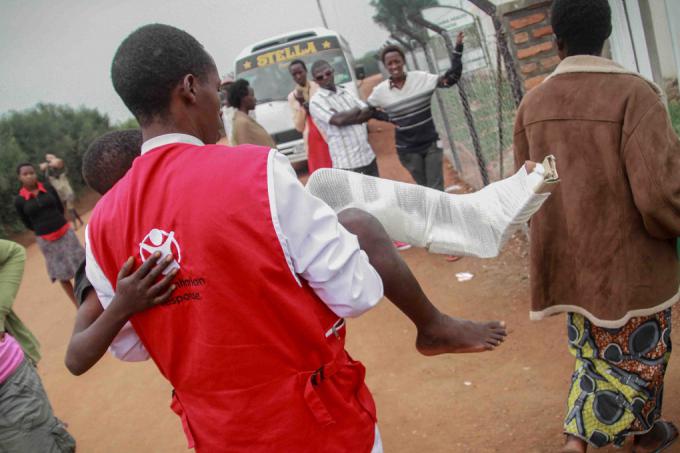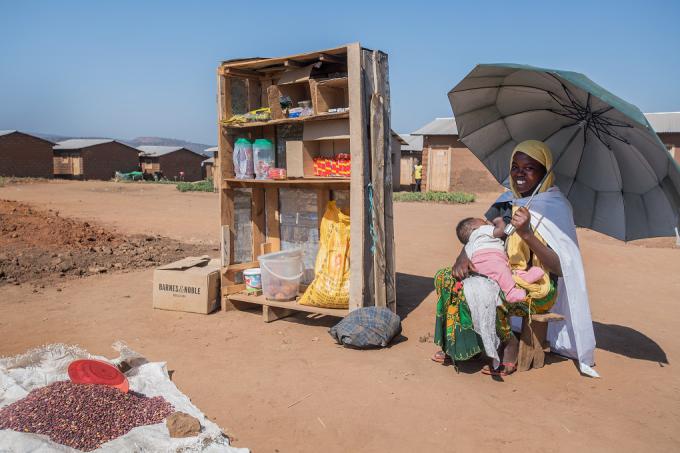Emergency Response
Save the Children has been responding to the influx of Burundi refugees hosted in Mahama Refugee Camp, Eastern Province of Rwanda. Over 53,638 refugees, including 32,149 children under 18 years old, are currently hosted in Rwanda’s Mahama refugee camp following civil unrest, violence and large-scale displacements from Burundi.
An average of 200 new Burundians continue to arrive to Rwanda each month through three transit centres (TCs) – Gatore, Nyanza and Bugesera – which are sites for registration and basic health, and protection services prior to transfer to Mahama camp for additional services.
a. Providing Health services in Emergencies:
Save the Children is the primary health care provider for Burundian refugees living in Mahama camp and significantly contributing to the reduction of morbidity and mortality in young children including through treatment of malaria, pneumonia and diarrhoea. We provide direct health program implementation in Mahama refugee camp, serving both refugee and host communities.
The Health and Nutrition interventions continue to have a direct impact on inpatient and outpatient beneficiaries. Our health and nutrition interventions, provides lifesaving services by minimizing both morbidity and mortality due to common illnesses. Save the Children ensures that essential health care services including referral are provided; disease surveillance is strengthened and households are engaged through social mobilization and health education to avoid preventable diseases and outbreak further; a rapid response team is ready to respond surveillance and provide intervention when epidemic occurs.
Save the Children introduced HIV Voluntary Counselling and Testing (VCT). This was also followed by providing anti-retroviral treatment (ART) to refugees infected by HIV and AIDS. Nurses and doctors have been trained in providing ART and treatment for AIDS.
Save the Children is providing the following health services for refugees living in Mahama II Camp: treatment of common diseases including HIV/AIDS; inpatient care for refugees; on-site lab services; referrals to secondary health care; a pharmacy stocked with drugs; management of acute malnutrition; maternal, reproductive, child and newborn health services; and mental health. The same services are delivered to host community referred to our health centre.

b. Nutrition services in Emergencies:
Save the Children is implementing Community Based Management of Acute Malnutrition (CMAM) for outpatient whereby supplementary feeding targets children aged 6-59 months, while blanket supplementary feeding targets children of 6-23months of age. The program targets also pregnant and lactating women.
We are managing moderate acute malnutrition (MAM) cases without medical complications.
SCI is providing Ready to Use Supplementary Food (RUSF) to children with acute malnutrition.
c. Child Protection in Emergencies
Save the Children Child Protection intervention aims at expanding protection mechanisms for vulnerable refugees in the camp in order to improve the psychosocial well-being, resilience and coping abilities of refugee children, to improve care and support for unaccompanied children, and to strengthen the quality of SGBV prevention and response activities and services.
a. Promoting Livelihoods in Emergencies
Save the Children embarked on a livelihoods and youth empowerment project in Mahama Refugee Camp for Burundians. The project aims to equip refugees with necessary livelihoods skills, and empower them to mobilize resources that enable them to increase their economic security, thereby reduces vulnerability created exacerbated by conflict, pursue goals necessary for their survival and possible return. The project aims to address food insecurity, access to basic needs and protection issues through an integrated child sensitive livelihood intervention that improve children’s, parents and caregivers access to food and income to meet other basic needs. We are providing a unique legal and economic enabling environment for refugees to gain productive livelihoods. The project encourages refugees to work and establish businesses, pay taxes, create jobs and in most other ways contribute to Rwanda’s economy.

 Rwanda
Rwanda